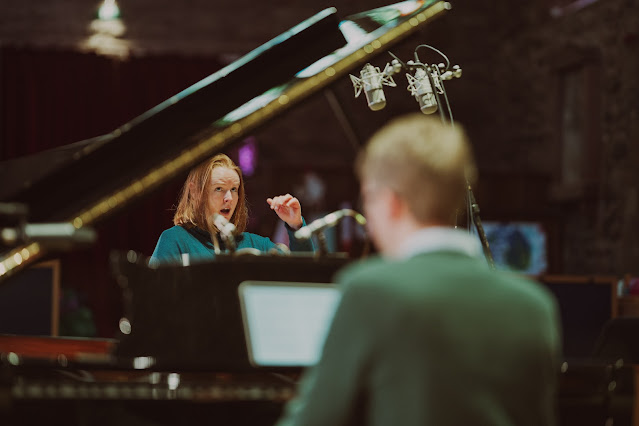Schubert Lieder: Love's Lasting Power; Harriet Burns, Ian Tindale; Delphian
Reviewed 5 February 2024
With a youthful flexibility, emotionalism and sense of urgency to the performances, this is a finely engaging and thoughtful debut recital for the duo
On their first joint recording, on Delphian, long-term performing partners Harriet Burns and Ian Tindale have made a personal choice of Schubert’s lieder, exploring the theme of love, but also the friendships and relationships between poets and the composer out of which he crafted songs of astonishing empathy.
Whilst Schubert's emotional life remains somewhat obscure, with it being unclear which, if any, of his personal relationships were more than close friendships, what cannot be gainsaid is that in his music he displays a remarkable ability to respond to a range of emotional turmoil. When discussing Schubert's setting of poetry by August von Platen (whom we know to be gay from his diaries), Graham Johnson comments that 'We cannot know the exact nature, platonic or romantic, of relationships in Schubert’s circle, but his ability to empathise with Platen’s plight is profoundly moving.'
Burns and Tindale's selection involves not only songs exploring emotions arising from loving someone, but also songs setting poetry which relates to intimate friendships. At the centre of the recital is the long setting of Viola by Schubert's close friend Franz von Schober; a slightly curious poem about a tender flower who is over-eager and subsequently blighted, dying alone and ashamed. The subject must have been painfully close to the bone for Schubert in 1823 when he was suffering the first symptoms of syphilis.
However we begin in more upbeat mode with Die Liebe (Freudvoll und leidvoll), one of those songs that almost seems to begin in the middle, as if we were overhearing something longer. Burns sings with lovely long, considered lines and the song forms a fine opening showcase for her vibrant, lyric soprano. The joy in Lachen und Weinen is rather considered, Burns hints at melancholy too though Tindale's piano provides a firm backdrop of dance. This continues with Die Männer sind mechant where Burns turns fine storyteller.
 |
| Harriet Burns & Ian Tindale at recording sessions (Photo: foxbrush.co.uk) |
Both Lambertine and Die Liebe hat gelogen have a rather touching quality, whilst there is an impetuosity and urgency to An mein Herz. Der Jüngling an der Quelle is similarly touching, with a nice clarity and vivid piano. However, drama really comes to the fore in Der Zwerg where Burns' story telling is complemented by the dark drama in Tindale's piano. We return to lyric melancholy in Hippolits Lied, then Du liebst mich nicht combines intimacy with urgent intensity.
It is easy to not take Viola, with its little refrain, seriously, it is frankly such an odd song. But clearly meant something to Schubert (and perhaps to Schober too). Here Burns and Tindale bring a sense of youthful engagement so it is touching and sometimes urgent without being saccharine. We end with a tender account of Geheimnis, yet with hints of stronger character in the piano, and a surprisingly joyful and dancey Seligkeit.
The selection of songs here is admirably varied, not just to the top twenty hits, and it perhaps reflects the duo's long experience of performing Schubert together (some eight years, I believe). There is a youthful flexibility, emotionalism and sense of urgency to many of the performances, and overall you feel that the two bring out the interesting colours and darker elements that underpin even the most straightforward of songs.
 |
| Harriet Burns & Ian Tindale at recording sessions (Photo: foxbrush.co.uk) |
Schubert Lieder: Love's Lasting Power
1 Die Liebe (Freudvoll und leidvoll), D210 [1:36]
2 Lachen und Weinen, D777 [1:48]
3 Die Männer sind mechant (from Vier Refrainlieder), D866 No. 3 [2:36]
4 Dass sie hier gewesen, D775 [2:56]
5 Suleika I, D720 [5:15]
6 Wiedersehn, D855 [2:43]
7 Heimliches Lieben, D922 [4:23]
8 Versunken, D715 [2:16]
9 Erster Verlust, D226 [1:48]
10 Amalia, D195 [3:20]
11 Lambertine, D301 [3:14]
12 Die Liebe hat gelogen, D751 [2:35]
13 An mein Herz, D860 [3:10]
14 Der Jüngling an der Quelle, D300 [1:51]
15 Der Zwerg, D771 [5:20]
16 Hippolits Lied, D890 [2:34]
17 Du liebst mich nicht, D756 [3:36]
18 Viola, D786 [12:48]
19 Geheimnis, D491 [2:26]
20 Seligkeit, D433 [2:01]
Harriet Burns (soprano)
Ian Tindale (piano)
Recorded on 8-10 February 2023 in St Mary’s Parish Church, Haddington
DELPHIAN DCD34251 1CD [68:27]
Never miss out on future posts by following us
The blog is free, but I'd be delighted if you were to show your appreciation by buying me a coffee.
Elsewhere on this blog
- Something a little bit special: David Butt Philip & friends gala for St Paul's Opera in Clapham - concert review
- A Star Next to the Moon: Stephen McNeff on his new opera, based on Juan Rulfo's Pedro Páramo, a seminal novel of magic realism - interview
- Horns galore: incandescent playing from Ben Goldscheider in the London premiere of Gavin Higgins' terrific new concerto - concert review
- Diagrams & sonatas: discs of solo piano music Arvo Pärt & Ivor Gurney, neither composer well-known for writing in the genre - record review
- Sophisticated timbres & detailed textures: UK premiere of Helen Grime's String Quartet No. 2 & Ravel's String Quartet from Heath Quartet at Wigmore Hall - concert review
- Clarity of musical purpose & remarkable intimacy: Regents Opera in Wagner's Siegfried - opera review
- Late romantic at Wigmore Hall: Timothy Ridout & Frank Dupree in York Bowen and Rebecca Clarke - concert review
- Late romantic at Wigmore Hall: Simon Callaghan in Cyril Scott's sonata - concert review
- Singing Wagner has been crucial: transgender tenor Holden Madagame on their journey towards singing Mime in Regents Opera's production of Siegfried - feature
- Home












No comments:
Post a Comment